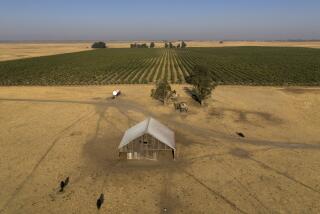COSTA MESA : Slaughterhouse Out as Farm Fund-Raiser
- Share via
A pen full of pink, roly-poly pigs can be raised on the Costa Mesa High School Farm, but they cannot be slaughtered there, as was suggested under a money-making proposal to save the farm from district budget cuts.
The school board has scrapped the controversial meatpacking plan and tentatively agreed to keep the school farm if involved parents and the community can help make the facility more self-sufficient.
“That was just one idea proposed as a way to generate income,” Board President Forest K. Werner said. “It was pretty well decided that a slaughterhouse wasn’t going to happen.”
The proposal for a slaughterhouse came from a Santa Ana-based biotechnology firm that uses pig pancreas for diabetes research. The plan raised the ire of parents and animal-rights activists who questioned the school’s role in such a venture.
Board members and school district officials said they received a number of calls asking that the district try to save the farm by other means.
If allowed to sell pork, the pig farm would have produced about half the farm’s annual $90,000 budget. Now the district is considering a combination of money-making projects to make the farm more profit-oriented.
“The primary thrust is that we’d be moving toward the plant and produce side of farming rather than the animal side,” said Costa Mesa High School Principal Michael Murphy.
The biotechnology firm, TranCel Inc., still might use the farm site and student workers to raise the pigs. Instead of herding a few dozen swine a month, a smaller-scale operation involving about 10 pigs might be considered.
“The swine project is still an option, but the slaughterhouse is completely out,” said Gary Haider, co-chairman of the parent boosters.
Parents hope to expand the farm’s plant production and are trying to sell flowers and shrubs to local landscapers, Haider said. Local growers might use part of the property to harvest crops, and the school is considering leasing out parcels of the farm to local residents for community farming.
District officials have also cut the farm teacher’s salary and classes, putting her on a part-time schedule to save money.
The 18-acre school farm is the only one in the district and one of about seven left in the county. Haider said farm supporters hope to hold dances and picnics to encourage more students to join the school’s agricultural program. The class can be taken for credit or as an extracurricular activity.
“It’s a very valuable program, especially in an urban setting,” Murphy said. “Several kids (involved) have really found themselves out there.”
More to Read
Sign up for Essential California
The most important California stories and recommendations in your inbox every morning.
You may occasionally receive promotional content from the Los Angeles Times.














